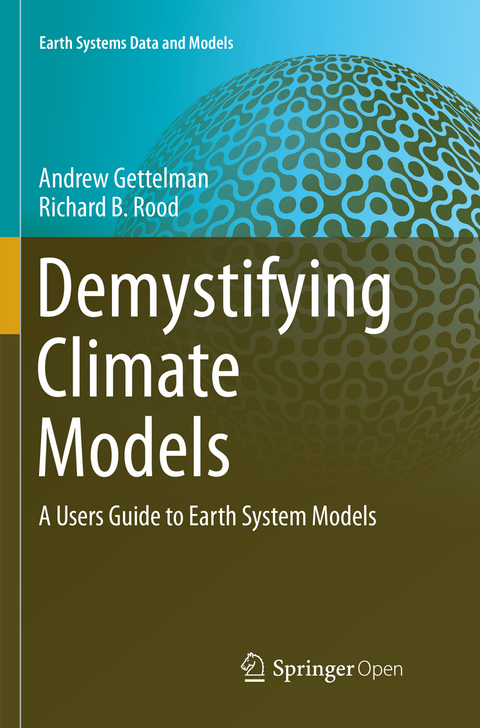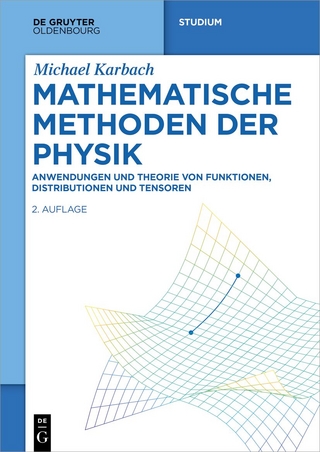
Demystifying Climate Models
Springer Berlin (Verlag)
978-3-662-56964-1 (ISBN)
Andrew Gettelman is a Scientist in the Climate and Global Dynamics and Atmospheric Chemistry and Modeling Laboratories at the National Center for Atmospheric Research (NCAR). He is actively involved in developing atmosphere and chemistry components for global climate models at NCAR. Dr. Gettelman specializes in understanding and simulating cloud processes and their impact on climate, especially ice clouds. He has numerous publications on cloud physics representations in global models, as well as research on climate forcing and feedbacks. He has participated in several international assessments of climate models, particularly for assessing atmospheric chemistry. Gettelman holds a doctorate in Atmospheric Science from the University of Washington, Seattle. He is a recent recipient of the American Geophysical Union Ascent Award, and is a Thompson-Reuters Highly Cited Researcher. Richard B. Rood is a Professor in the Department of Climate and Space Sciences and Engineering (CLaSP) at the University of Michigan. He is also appointed in the School of Natural Resources and Environment. Prior to joining the University of Michigan, he worked in modeling and high performance computing at the National Aeronautics and Space Administration (NASA). His recent research is focused on the usability of climate knowledge and data in management planning and practice. He has started classes in climate-change problem solving, climate change uncertainty in decision making, climate-change informatics (with Paul Edwards). In addition to publications on numerical models, his recent publications include software engineering, informatics, political science, social science, forestry and public health. Rood's professional degree is in Meteorology from Florida State University. He recently served on the National Academy of Sciences Committee on A National Strategy for Advancing Climate Modeling. He writes expert blogs on climate change science and problem solving for the Weather Underground Richard Rood is a Fellow of American Meteorological Society and a winner of the World Meteorological Organization's Norbert Gerbier Award.
Introduction.-Components of the Climate System.- Climate Change and Global Warming.- Essence of a Climate Model.- Simulating the Atmosphere.- Simulating the Ocean and Sea Ice.- Simulating Terrestrial Systems.- Bringing the System Together: Coupling and Complexity.- Model Evaluation.- Predictability.- Results of Current Models.- Usability of Climate Model Projections by Practitioners.- Summary and Final Thoughts.
| Erscheinungsdatum | 20.07.2018 |
|---|---|
| Reihe/Serie | Earth Systems Data and Models |
| Zusatzinfo | XVII, 274 p. 62 illus., 58 illus. in color. |
| Verlagsort | Berlin |
| Sprache | englisch |
| Maße | 155 x 235 mm |
| Gewicht | 4453 g |
| Themenwelt | Mathematik / Informatik ► Mathematik ► Angewandte Mathematik |
| Naturwissenschaften ► Biologie ► Ökologie / Naturschutz | |
| Technik ► Bauwesen | |
| Technik ► Umwelttechnik / Biotechnologie | |
| Schlagworte | Anthropogenic Climate Change • Climate Forcing • Confidence Of Climate Predictions • Coupled Climate System Model • Energy Flows • Finite Element Model • General Circulation Models • Greenhouse Gases • Human System Models • Keeling Curve • Model Evaluation And Validation • Model Perfomance • Ozone Assessment • Prediction Of Extreme Events • Scenario Uncertainty • Sea-Ice Models • Tropical Cyclones • Type Of Climate Models • Uncertainties In Climate Models • Weather Models |
| ISBN-10 | 3-662-56964-7 / 3662569647 |
| ISBN-13 | 978-3-662-56964-1 / 9783662569641 |
| Zustand | Neuware |
| Haben Sie eine Frage zum Produkt? |
aus dem Bereich


